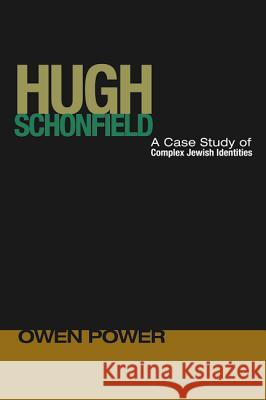Hugh Schonfield: A Case Study of Complex Jewish Identities » książka
Hugh Schonfield: A Case Study of Complex Jewish Identities
ISBN-13: 9781620322673 / Angielski / Miękka / 2013 / 138 str.
Hugh Schonfield: A Case Study of Complex Jewish Identities
ISBN-13: 9781620322673 / Angielski / Miękka / 2013 / 138 str.
(netto: 80,74 VAT: 5%)
Najniższa cena z 30 dni: 83,39
ok. 16-18 dni roboczych.
Darmowa dostawa!
With this book, Owen Power offers the first full-length intellectual history of the thinker Hugh Schonfield (1901-1988). Power contextualises Schonfield and his work in the spheres of Jewish ideology and Messianic Jewish politics as a means to explain the complicated nature of Messianic Jewish identity. There are many problems in making sense of the varied claims made about the Jewishness of Jewish Believers in Jesus-as there is a striking lack of agreement as to their Jewish status among halakhic authorities-and there is no real consensus among Messianic Jews themselves in answering the question, "Who is a (Messianic) Jew?" On the other hand, the attitude of many Jewish commentators regarding Messianic Jews is that they are traitors and apostates pretending to be Jews-Christian missionaries hell-bent on enticing Jews from their communities to the welcoming embrace of the Church. Normative Jewish opinion tends to treat Jewish Believers in Jesus as a monolithic group and thus fails to recognise the wide range of groups and individuals who claim to be Messianic Jews, even if there is among them little consensus as to what such a label means. Schonfield's case both reinforces such convictions and problematizes them.
With this book, Owen Power offers the first full-length intellectual history of the thinker Hugh Schonfield (1901-1988). Power contextualises Schonfield and his work in the spheres of Jewish ideology and Messianic Jewish politics as a means to explain the complicated nature of Messianic Jewish identity. There are many problems in making sense of the varied claims made about the Jewishness of Jewish Believers in Jesus-as there is a striking lack of agreement as to their Jewish status among halakhic authorities-and there is no real consensus among Messianic Jews themselves in answering the question, "Who is a (Messianic) Jew?" On the other hand, the attitude of many Jewish commentators regarding Messianic Jews is that they are traitors and apostates pretending to be Jews-Christian missionaries hell-bent on enticing Jews from their communities to the welcoming embrace of the Church. Normative Jewish opinion tends to treat Jewish Believers in Jesus as a monolithic group and thus fails to recognise the wide range of groups and individuals who claim to be Messianic Jews, even if there is among them little consensus as to what such a label means. Schonfields case both reinforces such convictions and problematizes them.











